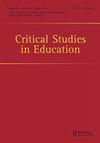探究西悉尼学校学生的学习隐喻
IF 2.7
2区 教育学
Q1 EDUCATION & EDUCATIONAL RESEARCH
引用次数: 1
摘要
摘要在学术和政策领域,学习往往被认为是终身的、动态的、建设性的,尤其是能动的。尽管如此,学生们的声音在这些领域很少享有特权,尤其是在政策方面。为了应对这种疏忽,我们运用福柯的知识理论来探索学生如何理解自己是学习者,并将其与主流的政治和学术话语结构一起考虑。使用隐喻卡片的方法,我们探索了学生在纵向焦点小组访谈中表达的学习隐喻。在为期两年的时间里,来自西悉尼四所学校的47名学生参与了这项研究,学生对学习的隐喻是多样和广泛的,经常反映出符合高风险毕业考试要求的战略学习方法。值得注意的是,学生们将自己描述为疲惫、被动的短暂学习容器,这与国家和国际政策以及高等教育将学习构建为“终身和能动的”是不一致的。这一矛盾引发了关于学生在学校学习经历、教师教育的作用以及旨在增加受教育边缘化学生的机会和参与度的大学公平计划的重新指导的关键问题。本文章由计算机程序翻译,如有差异,请以英文原文为准。
Exploring students’ metaphors for learning in Western Sydney schools
ABSTRACT In both academic and policy spaces, learning is often cast as lifelong, dynamic, constructive and in particular, agentic. Despite this focus students’ voices are rarely privileged in these spaces – especially in policy. We respond to this oversight by deploying Foucault’s theories of knowledge to explore how students understand themselves as learners, considering this alongside dominant political and academic discursive constructions of learning. Using a metaphor card approach, we explored metaphors for learning articulated by students in longitudinal focus group interviews. Conducted over a two-year period with 47 students from four Western Sydney schools, student metaphors for learning were diverse and wide-ranging, frequently reflecting strategic approaches to learning that aligned with requirements of high stakes exit exams. Significantly, student descriptions of themselves as exhausted, passive containers of impermanent learning were at odds with national and international policy and higher education constructions of learning as ‘lifelong and agentic’. This contradiction raises critical questions about students’ experiences of learning in schools, the role of teacher education, and re-direction of university equity programmes aimed at increasing access and participation for educationally marginalised students.
求助全文
通过发布文献求助,成功后即可免费获取论文全文。
去求助
来源期刊

Critical Studies in Education
EDUCATION & EDUCATIONAL RESEARCH-
CiteScore
10.10
自引率
5.10%
发文量
18
期刊介绍:
Critical Studies in Education is one of the few international journals devoted to a critical sociology of education, although it welcomes submissions with a critical stance that draw on other disciplines (e.g. philosophy, social geography, history) in order to understand ''the social''. Two interests frame the journal’s critical approach to research: (1) who benefits (and who does not) from current and historical social arrangements in education and, (2) from the standpoint of the least advantaged, what can be done about inequitable arrangements. Informed by this approach, articles published in the journal draw on post-structural, feminist, postcolonial and other critical orientations to critique education systems and to identify alternatives for education policy, practice and research.
 求助内容:
求助内容: 应助结果提醒方式:
应助结果提醒方式:


